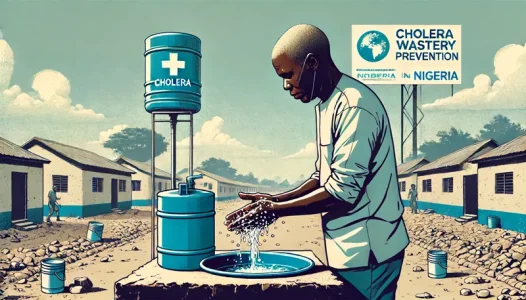
| Summary: Nigeria faces a severe cholera outbreak, with over 1,100 cases reported. This article provides essential tips to protect yourself and your family, including ensuring safe drinking water, practicing good hand hygiene, maintaining proper sanitation, and safe food practices. Early detection and prompt medical treatment are crucial. Stay informed and follow these guidelines to prevent the spread of cholera in your community. |
In recent months, Nigeria has faced a significant cholera outbreak, with over 1,100 cases and at least 30 deaths reported across various states, including Lagos, Bayelsa, Zamfara, and Bauchi. Poor sanitation, contaminated water sources, and the effects of recent flooding have worsened the outbreak. As the rainy season continues, individuals must take preventive measures to protect themselves and their families from this potentially deadly disease.
Understanding Cholera
Cholera is an acute diarrheal illness caused by ingesting food or water contaminated with the bacterium Vibrio cholerae. It spreads rapidly in areas with inadequate water treatment, poor sanitation, and insufficient hygiene practices. The disease can lead to severe dehydration and, if untreated, can be fatal within hours.Key Preventive Measures
- Ensure Safe Drinking Water:
- Boil Water: Always boil water before drinking to kill harmful bacteria.
- Use Water Purification Tablets: These can effectively disinfect water, making it safe for consumption.
- Store Water Safely: Keep water in clean, covered containers to prevent contamination.
- Practice Good Hand Hygiene:
- Wash Hands Regularly: Use soap and clean water, especially before eating, after using the toilet, and before preparing food.
- Use Hand Sanitiser: If soap and water are unavailable, use an alcohol-based hand sanitiser.
- Safe Food Practices:
- Cook food Thoroughly: Ensure that food, especially seafood, is cooked properly to kill bacteria.
- Wash Fruits and Vegetables: Use safe water to wash all raw foods before consumption.
- Avoid Street Food: Be cautious with street food, as it might be prepared with contaminated water.
- Maintain Proper Sanitation:
- Use Toilets: Avoid open defecation to prevent contamination of water sources.
- Dispose of Waste Properly: Ensure that refuse is disposed of in a sanitary manner and sewage systems are maintained.
- Community Vigilance:
- Report Symptoms: If you or someone in your community shows symptoms of cholera, such as severe diarrhoea and vomiting, seek medical attention immediately.
- Educate Others: Participate in community education programs to raise awareness about cholera prevention.
Importance of Early Detection and Treatment
Early symptoms of cholera include sudden onset of severe watery diarrhoea, vomiting, and dehydration. Prompt treatment is essential to prevent severe complications. Oral rehydration solutions (ORS) can be administered to replace lost fluids and electrolytes, and in severe cases, intravenous fluids and antibiotics may be required.The Nigerian government and international organisations like UNICEF and the WHO are actively working to control the outbreak by providing medical supplies, improving water and sanitation infrastructure, and conducting public health campaigns. By adhering to these preventive measures and staying informed, individuals can play a crucial role in curbing the spread of cholera and protecting their communities.
For more detailed guidelines and updates, visit the official websites of the Nigeria Centre for Disease Control (NCDC) and the World Health Organization (WHO).




